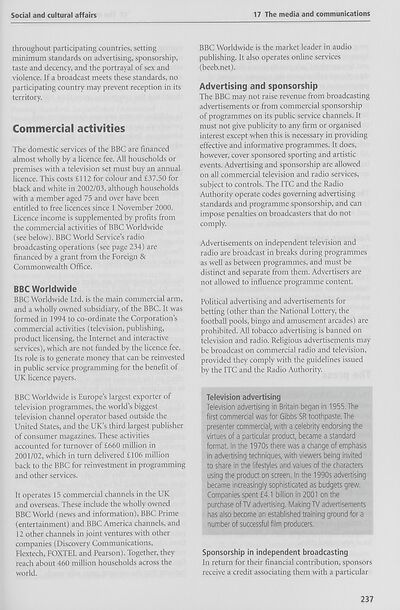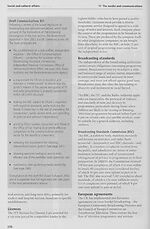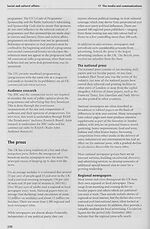Download files
Complete book:
Individual page:
Thumbnail gallery: Grid view | List view

Social and cultural affairs
17 The media and communications
throughout participating countries, setting
minimum standards on advertising, sponsorship,
taste and decency, and the portrayal of sex and
violence. If a broadcast meets these standards, no
participating country may prevent reception in its
territory.
Commercial activities
The domestic services of the BBC are financed
almost wholly by a licence fee. All households or
premises with a television set must buy an annual
licence. This costs £112 for colour and £37.50 for
black and white in 2002/03, although households
with a member aged 75 and over have been
entitled to free licences since 1 November 2000.
Licence income is supplemented by profits from
the commercial activities of BBC Worldwide
(see below). BBC World Service’s radio
broadcasting operations (see page 234) are
financed by a grant from the Foreign &
Commonwealth Office.
BBC Worldwide
BBC Worldwide Ltd. is the main commercial arm,
and a wholly owned subsidiary, of the BBC. It was
formed in 1994 to co-ordinate the Corporation’s
commercial activities (television, publishing,
product licensing, the Internet and interactive
services), which are not funded by the licence fee.
Its role is to generate money that can be reinvested
in public service programming for the benefit of
UK licence payers.
BBC Worldwide is Europe’s largest exporter of
television programmes, the world’s biggest
television channel operator based outside the
United States, and the UK’s third largest publisher
of consumer magazines. These activities
accounted for turnover of £660 million in
2001/02, which in turn delivered £106 million
back to the BBC for reinvestment in programming
and other services.
It operates 15 commercial channels in the UK
and overseas. These include the wholly owned
BBC World (news and information), BBC Prime
(entertainment) and BBC America channels, and
12 other channels in joint ventures with other
companies (Discovery Communications,
Flextech, FOXTEL and Pearson). Together, they
reach about 460 million households across the
world.
BBC Worldwide is the market leader in audio
publishing. It also operates online services
(beeb.net).
Advertising and sponsorship
The BBC may not raise revenue from broadcasting
advertisements or from commercial sponsorship
of programmes on its public service channels. It
must not give publicity to any firm or organised
interest except when this is necessary in providing
effective and informative programmes. It does,
however, cover sponsored sporting and artistic
events. Advertising and sponsorship are allowed
on all commercial television and radio services,
subject to controls. The ITC and the Radio
Authority operate codes governing advertising
standards and programme sponsorship, and can
impose penalties on broadcasters that do not
comply.
Advertisements on independent television and
radio are broadcast in breaks during programmes
as well as between programmes, and must be
distinct and separate from them. Advertisers are
not allowed to influence programme content.
Political advertising and advertisements for
betting (other than the National Lottery, the
football pools, bingo and amusement arcades) are
prohibited. All tobacco advertising is banned on
television and radio. Religious advertisements may
be broadcast on commercial radio and television,
provided they comply with the guidelines issued
by the ITC and the Radio Authority.
Television advertising
Television advertising in Britain began in 1955. The
first commercial was for Gibbs SR toothpaste. The
presenter commercial, with a celebrity endorsing the
virtues of a particular product, became a standard
format. In the 1970s there was a change of emphasis
in advertising techniques, with viewers being invited
to share in the lifestyles and values of the characters
using the product on screen. In the 1990s advertising
became increasingly sophisticated as budgets grew.
Companies spent £4.1 billion in 2001 on the
purchase of TV advertising. Making TV advertisements
has also become an established training ground for a
number of successful film producers.
Sponsorship in independent broadcasting
In return for their financial contribution, sponsors
receive a credit associating them with a particular
237
17 The media and communications
throughout participating countries, setting
minimum standards on advertising, sponsorship,
taste and decency, and the portrayal of sex and
violence. If a broadcast meets these standards, no
participating country may prevent reception in its
territory.
Commercial activities
The domestic services of the BBC are financed
almost wholly by a licence fee. All households or
premises with a television set must buy an annual
licence. This costs £112 for colour and £37.50 for
black and white in 2002/03, although households
with a member aged 75 and over have been
entitled to free licences since 1 November 2000.
Licence income is supplemented by profits from
the commercial activities of BBC Worldwide
(see below). BBC World Service’s radio
broadcasting operations (see page 234) are
financed by a grant from the Foreign &
Commonwealth Office.
BBC Worldwide
BBC Worldwide Ltd. is the main commercial arm,
and a wholly owned subsidiary, of the BBC. It was
formed in 1994 to co-ordinate the Corporation’s
commercial activities (television, publishing,
product licensing, the Internet and interactive
services), which are not funded by the licence fee.
Its role is to generate money that can be reinvested
in public service programming for the benefit of
UK licence payers.
BBC Worldwide is Europe’s largest exporter of
television programmes, the world’s biggest
television channel operator based outside the
United States, and the UK’s third largest publisher
of consumer magazines. These activities
accounted for turnover of £660 million in
2001/02, which in turn delivered £106 million
back to the BBC for reinvestment in programming
and other services.
It operates 15 commercial channels in the UK
and overseas. These include the wholly owned
BBC World (news and information), BBC Prime
(entertainment) and BBC America channels, and
12 other channels in joint ventures with other
companies (Discovery Communications,
Flextech, FOXTEL and Pearson). Together, they
reach about 460 million households across the
world.
BBC Worldwide is the market leader in audio
publishing. It also operates online services
(beeb.net).
Advertising and sponsorship
The BBC may not raise revenue from broadcasting
advertisements or from commercial sponsorship
of programmes on its public service channels. It
must not give publicity to any firm or organised
interest except when this is necessary in providing
effective and informative programmes. It does,
however, cover sponsored sporting and artistic
events. Advertising and sponsorship are allowed
on all commercial television and radio services,
subject to controls. The ITC and the Radio
Authority operate codes governing advertising
standards and programme sponsorship, and can
impose penalties on broadcasters that do not
comply.
Advertisements on independent television and
radio are broadcast in breaks during programmes
as well as between programmes, and must be
distinct and separate from them. Advertisers are
not allowed to influence programme content.
Political advertising and advertisements for
betting (other than the National Lottery, the
football pools, bingo and amusement arcades) are
prohibited. All tobacco advertising is banned on
television and radio. Religious advertisements may
be broadcast on commercial radio and television,
provided they comply with the guidelines issued
by the ITC and the Radio Authority.
Television advertising
Television advertising in Britain began in 1955. The
first commercial was for Gibbs SR toothpaste. The
presenter commercial, with a celebrity endorsing the
virtues of a particular product, became a standard
format. In the 1970s there was a change of emphasis
in advertising techniques, with viewers being invited
to share in the lifestyles and values of the characters
using the product on screen. In the 1990s advertising
became increasingly sophisticated as budgets grew.
Companies spent £4.1 billion in 2001 on the
purchase of TV advertising. Making TV advertisements
has also become an established training ground for a
number of successful film producers.
Sponsorship in independent broadcasting
In return for their financial contribution, sponsors
receive a credit associating them with a particular
237
Set display mode to:
![]() Universal Viewer |
Universal Viewer | ![]() Mirador |
Large image | Transcription
Mirador |
Large image | Transcription
The item on this page appears courtesy of Office for National Statistics and may be re-used under the Open Government Licence for Public Sector Information.
| Britain and UK handbooks > UK: The official yearbook of the United Kingdom of Great Britain and Northern Ireland > 2003 > (267) |
|---|
| Permanent URL | https://digital.nls.uk/204926581 |
|---|
| Attribution and copyright: |
|
|---|---|
| Description | Three volumes of 'UK: The official yearbook of the United Kingdom of Great Britain and Northern Ireland', published annually by the Office of National Statistics from 2002-2005. |
|---|---|
| Shelfmark | GII.11 SER |
| Description | Three titles produced by the British Government from 1954-2005 describing 'how Britain worked'. They are: 'Britain: An official handbook' (1954-1998), 'Britain: The official yearbook of the United Kingdom' (1999-2001), and 'UK: The official yearbook of the United Kingdom of Great Britain and Northern Ireland' (2002-2005). These 50 reports provide an overview of Britain's economic, social and cultural affairs, its environment, international relations, and the systems of government. They give an impartial summary of government policies and initiatives, and explain how public services are organised. |
|---|---|
| Additional NLS resources: |
|

